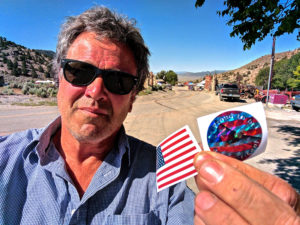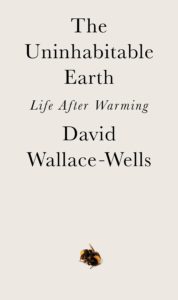
Like so many things lost amid our degrading obsession with Donald Trump is this odd business of old(er) guard Democrats’ unwillingness to devote even one of their 13 scheduled candidate debates entirely to the issue of climate change. This could still happen, but for the moment the idea is going nowhere.
The realization that climate change is a fact of life, and not just a devious scare tactic whipped up out of thick, hot air by Al Gore — right after he got done inventing the internet — is steadily gaining bona fides. “Average” people have heard about it and more and more believe it is real. A few less believe it’ll get worse. Fewer still believe it’ll get a hell of a lot worse, to the point of global catastrophe.

Most of those worrying about what life will be like on Mother Earth in the year 2080 imagine places like Miami looking like Venice on a bad day, along with occasional stories of floodings and drownings in far-off Third World places our clueless leader refers to as “shithole countries.” But that, along with a bunch of dead polar bears and shorter winters, will be about it. We’ll just go on rooting for the home team and keeping up with the Kardashians.
What the majority of people have yet to accept and absorb is that, in fact, based purely on our current emission numbers, global catastrophe is already the far more likely scenario than a couple dead polar bears and watery lobbies on South Beach.
Far more.
And not 60 years off in the future, but in 20 years from now, when even a few of us “I got mine” geezers will still be shuffling around, albeit disappointed all to hell that our assisted-living condo in Naples, Florida is under three feet of water.
Denial, not being a river in Egypt, requires Baby Boomers not to read, much less take seriously, “The Uninhabitable Earth: Life After Warming” by David Wallace-Wells.

The short, briskly-paced book is, in a single phrase, flat-out terrifying. The sort of thing that changes pretty much everything you look at every day. And that’s just as things are in 2019, with the amount of carbon we’re pumping into the atmosphere today. The book is a stretched-out version of Wallace-Wells’ 2016 New York magazine story, that has become one of the three most-read pieces New York has ever published.
There is of course disagreement over the horrifying scenario Wallace-Wells paints — a world where much of the tropical and sub-tropical planet is unlivable because of sea rise, heat and humidity, and where even First World economies are crippled by the cost of constant, climate-fueled natural disasters and military conflict over mass migration.
Embedded in some of the disagreement in the scientific community — not the cynical chowderheads of the right-wing media bubble — is this thinking:
“Over the past decade, most researchers have trended away from climate doomsdayism. They cite research suggesting that people respond better to hopeful messages, not fatalistic ones; and they meticulously fact-check public descriptions of global warming, as watchful for unsupported exaggeration as they are for climate-change denial.” (From The Atlantic piece linked above.)
My suspicion is that this view, that, “All that doomsday shit is a bummer, man” is part of the Democrats’ no-climate debate calculation. Why have their candidates out there talking about how terrible and hopeless everything is when we’re organizing a pep rally to vote Trump out of office?
While Wallace-Wells persistently emphasizes that we already have the ability to arrest climate change before the tipping point, (it would require something like a global, WWII-size mobilization — good luck with that), there is a fascinating generational psychology at play here. These days, Boomers like me think more and more frequently about how many “good years” we have left. Twenty? Thirty? Not so many we’ll have to live through full-on climate catastrophe? So we largely ignore thoughts of climate horror and focus on other things — like the buffoonery of Trump.
But our children, who are beginning to accept that they will in all likelihood have to live through at least some level of climate (and economic) catastrophe — (at current rates of carbon exhaust, Wallace-Wells sees 2040 as the point where climate calamity becomes constant) — may think differently. As in, “Who among this crowd is actually smart enough to do something?”
Pretty much every Democrat in the race has said something about climate change. Jay Inslee, the has-no-shot-at-all Governor of Washington has made it his sole focus. But an actual debate with Inslee, or Pete Buttiegieg, or Elizabeth Warren and Joe Biden all forced to get deep in the weeds of “what to do” would, I believe, be instructive to the generations who are going to have to try and survive in Wallace-Wells’ most optimistic forecasts.
Also, deep in those weeds is Wallace-Wells’ and other climate-solvers’ real-world admonition that weaning the world off fossil fuels (as in: every car and truck is electric) and keeping up with steadily increasing energy demand is simple not mathematically possible with wind and solar alone. Like it or not, carbon-free nuclear has to be a primary option.
Given the most peer-reviewed and widely-accepted climate forecasts, what Democrat is prepared to advocate for that?

Thanks for mentioning nuclear power; I think it is at the center of candidates’ reluctance to talk about climate change policy.
The old-guard environmental groups are prejudiced against nuclear power. NRDC is promoting a plan which downplays any central role for it in the coming decades, writing “Our plan shows increased renewable energy deployment more than makes up for the lost low-carbon benefit of nuclear generation.” (https://www.nrdc.org/experts/matthew-mckinzie/nrdc-analysis-nuclear-energy-and-safer-climate-future). This is a specious statement.
What they’re not telling people is that you can’t run heavy industries on renewables, that there is no power source as energy intensive as fossil fuels other than nuclear, and that there is no completely consequence-free power source that can run an industrial society. The failure to honestly disclose these facts is right up there with climate change denial as far as misleading people and blocking necessary change. Most greenies I know truly believe you could run a steel plant off wind and/or solar power. They won’t accept the fact that living in an industrialized society requires trade-offs in safety and security.
An honest discussion of what renewables can and cannot do has to happen soon. Until then, it would be political suicide for any candidate to promote nuclear power as a response to climate change, since John Q. Public loathes it so much. And without being able to propose nuclear energy as a solution, no policy discussion can be honest, and therefore would be irrelevant.
I love taboos, and the liberal taboo about so much as a discussion of nuclear power is about as ironclad as they come. An adult conversation with the USA about converting both industry and our transportation fleet to electric immediately requires addressing the question of, “Where do we get that much power … in the next 10 years … if we’re ruling out fossil fuels?” In the future maybe we’ll have cold fusion. But the reality of this (critical) moment is that a new, arguably safer and cleaner, generation of (carbon-free) nuclear is the ONLY viable option. Wind, solar, hydroelectric, etc. are all bona fide. But even combined they do not offer the chance of seriously mitigating carbon emissions on the scale we must achieve in the very near term future.